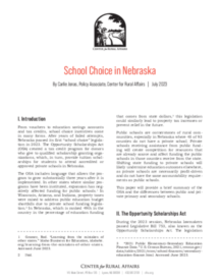From vouchers to education savings accounts and tax credits, school choice incentives come in many forms. After years of failed attempts, Nebraska passed its first “school choice” legislation in 2023. The Opportunity Scholarships Act (OSA) created a tax credit program for donors who give to qualified scholarship granting organizations, which, in turn, provide tuition scholarships for students to attend accredited or approved private schools in Nebraska.
The OSA includes language that allows the program to grow substantially three years after it is implemented. In other states where similar programs have been instituted, expansion has negatively affected funding for public schools. In Wisconsin, Arizona, and Indiana, property taxes were raised to address public education budget shortfalls due to private school funding legislation. In Nebraska, which is ranked 49th in the country in the percentage of education funding that comes from state dollars, this legislation could similarly lead to property tax increases or prevent relief in the future.
Public schools are cornerstones of rural communities, especially in Nebraska where 48 of 93 counties do not have a private school. Private schools receiving assistance from public funding will create competition for resources that are already scarce and affect funding the public schools in those counties receive from the state. Shifting state funding to private schools will likely undermine education outcomes elsewhere, as private schools are necessarily profit-driven and do not have the same accountability requirements as public schools.
This paper will provide a brief summary of the OSA and the differences between public and private primary and secondary schools.
Small Towns
Policy


